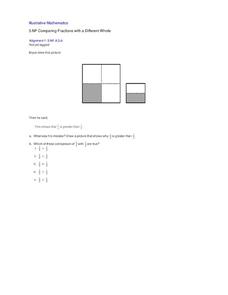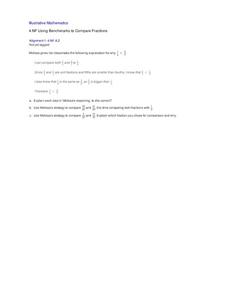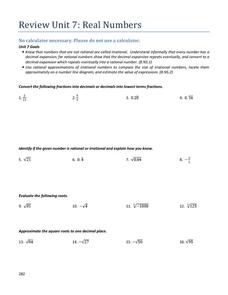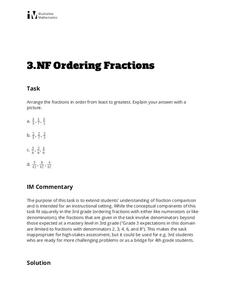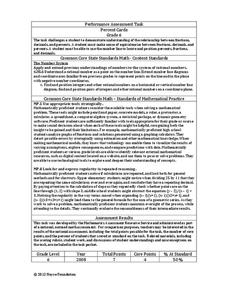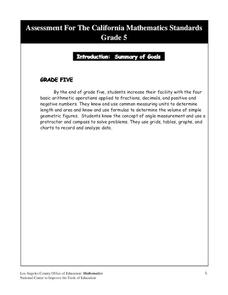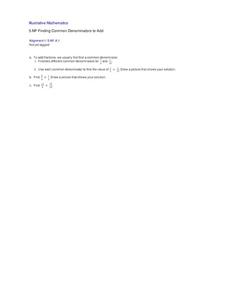Curated OER
Comparing Fractions with a Different Whole
What was Bryce's mistake? Through analysis of a student work example, learners develop their own ability to compare the fractions one fourth and one half. Central to this activity is the concept that, when comparing fractions, the whole...
Illustrative Mathematics
Using Benchmarks to Compare Fractions
Introduce a new strategy for comparing fractions by analyzing Melissa's use of benchmarks. Walk the class through her process, calling on students to explain their understanding of each step she took. Then practice this method on two...
Illustrative Mathematics
Comparing Sums of Unit Fractions
First, add each set of fractions with unlike denominators. Then, compare their sums with the symbols <, >, or =.
Illustrative Mathematics
Fractions on the Number Line
Fractions are a common fear in school, but visualizing them on a number line can help your learners understand their relationship to one another. The activity provides two solutions; use either a number line or a common denominator....
Charleston School District
Review Unit 7: Real Numbers
Provide pupils with problems to check their understanding of the concepts within the unit. The seven-part series of lessons covers concepts related to irrational numbers. Learners convert between fractions and decimals, estimate the...
Curated OER
Find 2/3
This short problem with representing fractions on a number line is more than meets the eye. Labeled only with the numbers zero and 1/4, a number line is used to locate the fraction 2/3. A solution can be found in multiple ways, but young...
Illustrative Mathematics
Ordering Fractions
Here is a comparing and ordering fractions learning activity that extends young mathematicians understanding of fractions with like and non-like denominators. By representing and explaining each fraction in a picture or diagram, learners...
Illustrative Mathematics
Cooking with the Whole Cup
Whoops! Travis accidentally put too much butter into the recipe. Your bakers must find out how to alter the recipe to accommodate different changes by using unit rates and ratios . The activity has multiple parts and calculations with...
Curated OER
Which is Closer to 1?
A seemingly simple question that reveals a lot about a student's understanding of fractions. In finding an answer, learners compare fractions with different denominators that are both greater and less than one. No number line is...
California Education Partners
Improving Our Schools
Split the work three ways. Learners use their knowledge of fractions to solve problems dealing with splitting up work loads evenly between three groups. Scholars determine the fractional portion of work each group will do along with...
Noyce Foundation
Percent Cards
Explore different representations of numbers. Scholars convert between fractions, decimals, and percents, and then use these conversions to plot the values on a horizontal number line.
Illustrative Mathematics
Who is the Tallest?
A simple question, with a not-so-simple answer. Working with whole and mixed number measurements in inches, feet, and yards presents a problem with many possible solutions. A great activity that challenges the minds of young...
Illustrative Mathematics
Making Cookies
Hooray for chocolate chip cookies! Ask your mathematicians to triple a chocolate chip cookie recipe and then reduce the recipe by one-fourth. Your class may need two days to complete, tripling the recipe the first day and reducing the...
Noyce Foundation
Cereal
Find the best protein-packed cereal. The short assessment task covers equivalent and comparing ratios within a context. Pupils determine the cereal with the highest ratio of protein. A rubric helps teachers with point allotments for...
Los Angeles County Office of Education
Assessment for the California Mathematics Standards Grade 5
Test young mathematicians' knowledge with an assessment aligned to California's fifth grade state standards. The exam covers a multitude of concepts including fractions and decimals, positive and negative numbers, measurement; and...
Noyce Foundation
Sewing
Sew up your unit on operations with decimals using this assessment task. Young mathematicians use given rules to determine the amount of fabric they need to sew a pair of pants. They must also fill in a partially complete bill for...
Los Angeles County Office of Education
Assessment for the California Mathematics Standards Grade 2
Test scholars mathematic skills with an assessment addressing addition, subtraction, multiplication, place value, measurement, geometric shapes, expanded notation; and their ability to compare numbers, write number...
Illustrative Mathematics
Games at Recess
A great non-calculation problem that lets your math minds explore without the pressure of the right answer. Your learners will have to compare boys and girls playing soccer and jump rope during recess. How many more boys than girls are...
Illustrative Mathematics
Finding Common Denominators to Add
Finding common denominators is an important strategy when adding fractions with unlike denominators. In the first two questions in this three-question task, fifth graders are asked to combine fractions and draw a picture to show their...
Curated OER
Finding Common Denominators to Subtract
Subtracting fractions with unlike denominators can be overwhelming, but in this task, 5th graders work systematically to break down the procedure through three questions. The first two questions ask for pictures to be drawn along...
Illustrative Mathematics
Buying Bananas, Assessment Version
Practice with unit rates, proportions, and ratios when Carlos purchases an amount of bananas. Learners must interpret a graph to decide whether points on the same line represent similar proportional relationships. Use with lesson plans...
Illustrative Mathematics
Origami Stars
This one problem concentrates on the important concept of dividing a whole number by a unit fraction. Here, young mathematicians use pictures they draw to help answer this problem. Insight into the connection between multiplication and...
EngageNY
Part of a Whole as a Percent
Pupils use visual models, numeric methods, and equations to solve percent problems. To complete the second installment of 20, they find the part given the percent and the whole, find the percent given the part and the whole, and find the...
California Education Partners
Photos
Why do all sizes of pictures not show the same thing? Class members analyze aspect ratios of various sizes of photos. They determine which sizes have equivalent ratios and figure out why some pictures need to be cropped to fit...
